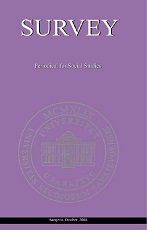Consociation: Switzerland and Bosnia and Herzegovina
Consociation: Switzerland and Bosnia and Herzegovina
Author(s): Nenad StojanovićSubject(s): Politics / Political Sciences
Published by: Univerzitet u Sarajevu
Keywords: Bosnia and Herzegovina; Switzerland; consociation; democracy; multicultural societies; nation; federalism.
Summary/Abstract: Consociational democracy is often considered a possible model for Bosnia and Herzegovina. There are numerous examples of Western countries that have, allegedly, successfully implemented such a model. Yet, the key example is Switzerland. In this work, the author analyses the Swiss case, underlining its similarities, and especially its differences, with Bosnia and Herzegovina: the concept of nation, the role of languages and religions, and the principle of territory. A special attention is paid to institutions. In the text we shall see that some Swiss institutions, such as the Parliament, violate the civic-democratic principle of “one person, one vote”, combining it with the territorial-federal principle which favours smaller territorial units (cantons). But this still does not mean that Switzerland is really a consociation. Contrary to the consociational model, the Swiss constitution does not institutionalise linguistic groups and their rights. The presence of linguistic groups in state institutions is ensured through informal practices and indirect institutional mechanisms. This is one of the reasons explaining why Switzerland is not a multinational state, composed of linguistically defined nations-peoples, but a civic multilingual nation-state.
Journal: SURVEY - Periodical for Social Studies
- Issue Year: 2008
- Issue No: 1
- Page Range: 49-73
- Page Count: 25
- Language: English

